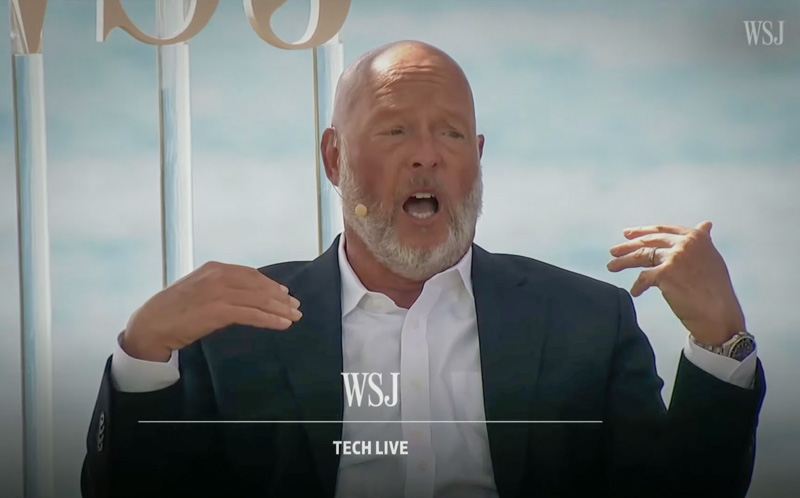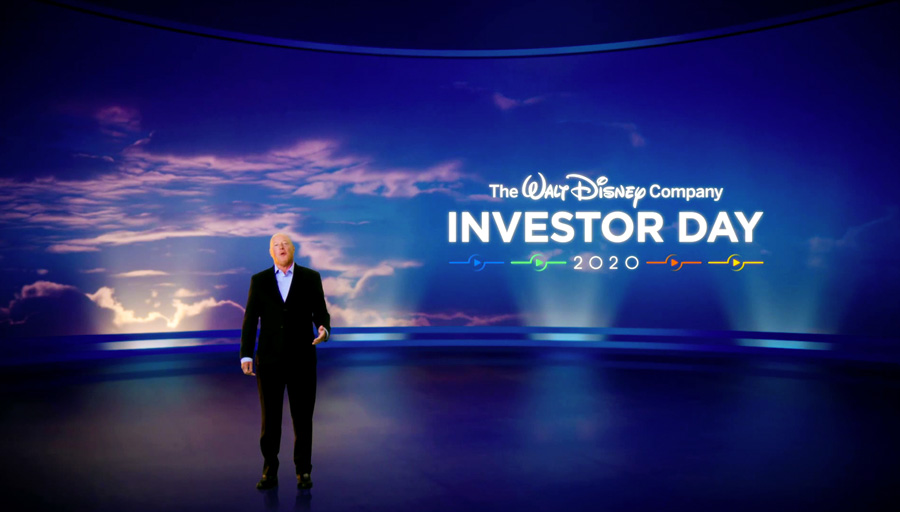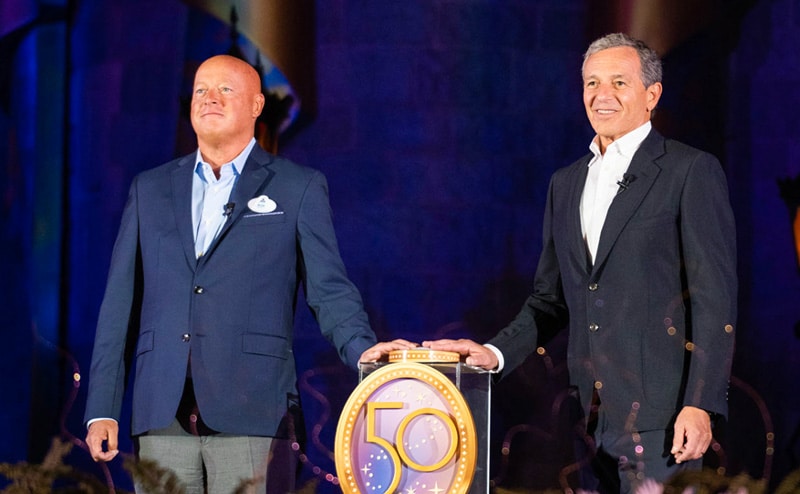
In its latest SEC filing, the Walt Disney Company has shared executive compensation packages for CEOs Bob Chapek and Bob Iger, CFO Christine McCarthy and others in the current c-suite, plus the fired Geoff Morrell. This post takes a look at those numbers and Disney’s explanation for the salaries, severance, and bonuses.
Normally, we wouldn’t cover executive salaries. They’re one of those pot-stirring subjects that seem aimed at infuriating fans, many of whom would believe Bob Chapek was overpaid if his annual salary was $1.97. Of course, the real number is much higher and that only further fuels animosity and questions about executive pay as compared to frontline Cast Members.
However, I’ve really enjoyed Disney’s Bob Swap/Battle of the Bobs (which really should be made into a Disney+ reality TV show; I don’t watch the Kardashians, but this has gotta be better than that!) and this is a natural extension of that. The SEC filing also contains a fascinating window in the thought process of Disney’s Board in extending and then firing former CEO Bob Chapek in such a short span of time.
We’ve already covered how all of that went down, but to quickly recap, the Walt Disney Company’s Board of Directors extended CEO Bob Chapek’s contract for three more years last summer. Given Hollywood rumblings at the time, it was a surprise move. Prior to this extension, Chapek’s comedy of unforced errors almost led to his own undoing.
Among other things, that included his hamfisted handling of the Black Widow lawsuit filed by Scarlett Johansson, firing of Peter Rice, and slew of stupid statements. Most notably, there was Chapek’s flip-flopping on legislation in Florida that alienate everyone, drawing the ire of Governor Ron DeSantis, and culminating in Florida passing bills to dissolve Walt Disney World’s Reedy Creek Improvement District.

Per multiple reports, multiple members of Disney’s Board of Directors were hesitant about extending Chapek’s contract over the summer and instead wanted him replaced. The Board courted various interim replacement candidates who could lead the Walt Disney Company while conducting a more comprehensive search for a new permanent leader, this included a couple of Board members, including former Nike executive and new Disney Board Chairman Mark Parker.
Despite the Board’s in-fighting, they released a statement of “unanimous” statement of confidence and support for Chapek. In actuality, it was far from unanimous. Had even one person who was approached wanted the job, Chapek would’ve been kicked to the curb then. When the Board’s hand was forced to extend Chapek’s contract it was thus for lack of better options, and there was debate about whether he should get three years or only two. In the end, Chapek’s contract was extended for three years but backdated. That left slightly more than 2 years remaining on his deal with Disney.

Of course, extending Chapek’s contract didn’t actually fix the underlying issues with his assorted controversies or leadership style. He did not have the Board’s confidence, and the situation remained tenuous. There was revolt in Disney’s c-suite (covered in exhaustive detail throughout our ongoing Battle of the Bobs series) in the months that followed.
The situation ultimately became untenable after the most recent earnings call. Wall Street investors and analysts lambasted Chapek for his “delusional” presentation of the results and unimpressive forward-looking guidance. He was fired shortly thereafter, with Bob Iger brought back to replace him.
This timeline has been pieced together via multiple leaks from the Iger and Chapek camps, as the palace intrigue played out in the Hollywood trades throughout November and December (and in fact, it keeps going–just yesterday, The Hollywood Reporter had another new and fascinating piece). Now, we have Disney’s official explanation (from Disney’s SEC Proxy Statement) as to why the Board extended Chapek only to fire him a few months later…

“In June 2022, the Board agreed to extend Mr. Chapek’s employment agreement based on Mr. Chapek’s work navigating the Company through the unprecedented challenges of the pandemic and growing the Company’s streaming business. The Board continued to spend significant time discussing the leadership of the Company in the months that followed and determined that Mr. Chapek was no longer the right person to serve in the CEO role.
The significant developments and change in the broader macroeconomic environment over this period informed how the Board viewed the appropriate leader in light of the rapidly evolving industry and market dynamics. The Board therefore concluded that, as Disney embarks on an increasingly complex period of industry transformation, Mr. Iger is best situated to lead the Company while an appropriate longer-term successor is identified.
On November 20, 2022 (after fiscal 2022), the Board decided to exercise its right to terminate Mr. Chapek’s employment without cause. In connection with this termination, in the event that Mr. Chapek successfully completes all of the terms of his post-employment consulting agreement and does not violate the terms of the employment agreement that survive his termination or the general release, Mr. Chapek’s severance would strictly conform to the terms of his employment agreement.”

Accordingly, Bob Chapek was entitled to the following cash termination payments:
- $6,527,397 in remaining base salary through the scheduled expiration date of his employment agreement
- $1,027,397 equivalent to a pro-rated target bonus for fiscal 2023
- $12,657,435 in restricted stock unit acceleration
That’s simply Bob Chapek’s severance, payable for fiscal 2023. In total, he’ll walk away with over $20 million for a little under two months’ worth of work. (Disney’s fiscal 2023 year started on October 1 and Chapek was fired on November 22.)

In fiscal 2022, Chapek was entitled to receive compensation under the annual performance-based bonus program pursuant to his employment agreement because his termination occurred after the end of the fiscal year. Per the SEC filing, Chapek’s total annual compensation, including the Company’s contribution to health insurance premiums, was $24,198,254. (This is actually down significantly as compared to the previous year, with much of the difference attributable to decreases in Disney’s share price.)
By contrast, the median Disney employee works in a full-time hourly role in Parks & Resorts and has been with Disney for over 11 years. For fiscal 2022, the median employee’s total annual compensation was $54,256. That makes the CEO to median Cast Member ratio 446:1.

For the fiscal 2022 year, Bob Iger earned $1.1 million in base pay, $4.6 million in stock awards, $2.4 million in options, $4.34 million in incentives, and $2.4 million in other compensation–for a total of just under $15 million. As a reminder, Iger left his Executive Chairman role at the end of the 2021 calendar year.
Disney’s SEC Proxy Statement also indicates that CFO Christine McCarthy’s compensation package totaled $20.2 million; General Counsel Horacio Gutierrez earned $15 million; HR chief Paul Richardson earned $5 million; and comms chief Kristina Schake earned $6.2 million.

Chapek wasn’t Disney’s only high-profile firing of last year. You might recall former head of corporate affairs Geoffrey Morrell, who was hired in January 2022 and terminated only a few months later. If you don’t, he was a press secretary for the U.S. Department of Defense under presidents George W. Bush and Obama, and handled comms for BP during clean-up (figuratively and literally) from the deadly Deepwater Horizon explosion and oil spill.
At Disney, Morrell was the architect for the original non-response to the Florida controversy. Oh, and he also accidentally announced the opening date for Guardians of the Galaxy: Cosmic Rewind, a hilarious gaffe that some fans thought was deliberate viral marketing. (It was not.)

Morrell had an exit package worth $8.4 million. He’s entitled to $2.5 million in remaining base salary through the end of his original employment agreement and $1.5 million equivalent to a target fiscal 2022 bonus. That’s a pretty stellar salary for about a quarter year’s worth of work, with two goof-ups as crowning achievements!
Morrell is also entitled to a buyout of the home he purchased in Southern California, consistent with past relocation practices for unique circumstances. Disney hired a third-party vendor to purchase the property on the company’s behalf in June 2022 for the same price at which the property was originally purchased. The Company will go through the sale process and realize any gains or losses on the sale of the property. As of October 1, 2022, the the home has not been sold.

In terms of commentary, I guess this illustrates that they’re called golden parachutes for a reason. There are a number of snide remarks that could be made about Chapek being paid over $20 million to go away. Many fans will undoubtedly say he doesn’t deserve it, CEO pay is out of control, yada yada yada. All of that commentary is so predictable and so played out–no minds would be changed about any of that. So instead, I’ll take this a couple of different directions.
My first thought is that Disney paying $20 million to never see or hear from Chapek again is money well spent. Bob Chapek’s Reign of Terror™️ easily cost the company double or triple that. Fending off the proxy battle that Chapek (arguably) induced, not to mention undoing his many bad decisions, will easily cost that or more. Nothing Disney does at a high level is cheap, whether that’s PR campaigns or swapping out the Mickey’s Toontown sign for an uglier version of basically the same thing. Whatever you estimate the cost of something to be by reasonable standards, at least double it for Disney inflation.

My other immediate thought is putting myself in the shoes of Bob Chapek, and being presented with two options. The first is taking $20 million and going silently into the night, living out the rest of my days disconnected from society in a (very fancy) cabin in Montana. The second is enduring a couple more years of helming Disney, wreaking havoc and chaos in the wake of everything I say or do, being hated by pretty much everyone, having to fight with Florida, and making ~$50 million.
Without a second of hesitation, I would choose the first option. Even factoring in the price explosion of luxury homes in Montana, the fancy cabin in the woods that I’d want is $10 million, tops. (That’s how much it would cost to build a scale replica of Country Bear Theater, right?) I’d get to be at peace and not deal with all of this. I know that’s not the calculus for power-hungry leaders…but why not? Perhaps they should read the parable of fisherman and the businessman.

My third thought is only relevant to sports fans, and it’s that after seeing the off-season spending spree by Major League Baseball teams, I’ve been desensitized to outrageous compensation. It feels like we’re only a day away from Steve Cohen announcing that he’s signed Bobby Bonilla to a new 10-year deal worth $400 million.
Seriously, what gives? MLB has had viewership and popularity problems for years, as it fails to attract younger audiences. And yet, there have been a surge of colossal contracts even for fairly middling players. It’s one thing to pay a generational talent big bucks, but many of these players are not that. By these standards, Shohei Ohtani deserves somewhere between $500 million and $1 billion next year as an actual generational talent. But I digress.

Finally, this whole debacle has been a case study in the right leadership being instrumental to success. Even if he had the business acumen, Chapek clearly was not cut out for the job. As Iger rightly points out, Chapek lacked the emotional intelligence, creative instincts, communication skills, and so many other necessary qualities necessary to lead the Walt Disney Company. (Or in our words, Bob Chapek Did Not “Get” Disney.)
In a prior regulatory filing, Disney revealed that current CEO Bob Iger will earn a $1 million base annual salary, with an annual target of $25 million for a long-term incentive award. Even those who claim that there’s little substantive difference between the Bobs cannot deny that Iger’s approach and deft touch are far superior.
Iger makes it look easy, but that’s simply because he is so good at the role. Iger easily adds $25 million in annual value to the company over Chapek. (This is not to say that there are only a handful of individuals on earth who could lead Disney and the fair market wage for CEO is $25 million. There is some degree of self-dealing and incestuousness with how c-suite salaries are set by boards.) The point still stands: Iger is worth $25 million more than Chapek, and Disney spending $20 million to make the latter go away was a good use of funds.
Need Disney trip planning tips and comprehensive advice? Make sure to read 2023 Disney Parks Vacation Planning Guides, where you can find comprehensive guides to Walt Disney World, Disneyland, and beyond! For Disney updates, discount information, free downloads of our eBooks and wallpapers, and much more, sign up for our FREE email newsletter!
YOUR THOUGHTS
What are your thoughts on Chapek’s compensation and severance? What about the “value” of paying to make Chapek go away and bringing Iger on board to replace him? Anything to add about the timeline and events that precipitated Disney’s Bob Swap™️, replacing Chapek with Iger? Thoughts on how it went down, the board’s decision to renew Chapek’s contract instead of replacing him over the summer, or anything else covered here? Agree or disagree with the firing of Chapek? Think things will improve or get worse throughout 2023? Do you agree or disagree with our assessment? Any questions we can help you answer? Hearing your feedback–even when you disagree with us–is both interesting to us and helpful to other readers, so please share your thoughts below in the comments!





